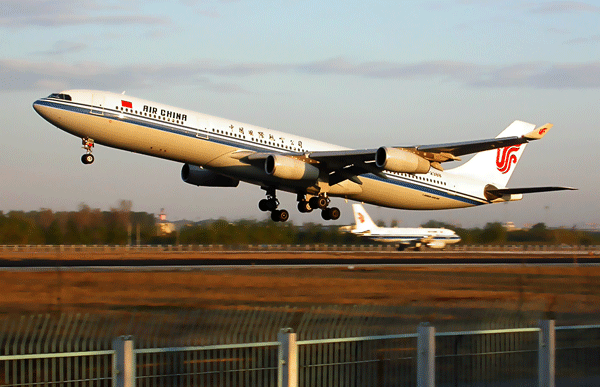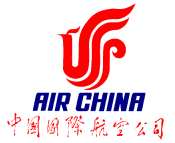Air China Cargo Aims
For Top Ten Ranking


Mr. LI Jiaxiang |
Air China, the People's Republic of China's
state owned and largest commercial airline (not to be confused with
China Airlines, which is the Republic of China Taiwan's state airline)
is on the move.
Air China signaled its intentions of continuing an investor-driven
market approach begun with an IPO at the carrier in 2004, when last
month the carrier said that it completed issuance of RMB 3 billion
in corporate bonds that were issued on September 16.
The 10-year Bonds will pay out interest on a yearly basis with the
annual fixed rate of 4.50% with proceeds used to finance the purchase
of the 10 A330-200 aircraft and 15 B787 aircraft.
As the sole official carrier partner of the 2008 Beijing Olympics
Games, Air China today is the most recognized airline by mainstream
passengers, the most profitable, the most valuable and the most globally
competitive airline among all Chinese carriers.
Recently Air China and Cathay Pacific Airways further agreed to promote
sales and marketing initiatives between the two airlines, including
a code-sharing arrangement for flights between Hong Kong and Beijing.
Chairman of Air China Limited, Mr. LI Jiaxiang said :
“Air China and Cathay Pacific working together will offer a
more attractive options to our customers, with more services between
Hong Kong and Beijing and more timely connections through the Hong
Kong hub to and from our other destinations.” |
(Exclusive Interview with Mr. Zhang Xueren, Vice-President
of Air China Ltd and General Executive of Air China Cargo)
A few years ago while most of China’s
domestic airlines still operated passenger and cargo businesses together,
Air China Limited invested RMB 3.5 billion to form Air China Cargo, the
first independent air cargo company in China.
That was then.
During an interview at Air China Cargo headquarters,
Mr. Zhang Xueren said, that today Air China Cargo is not sitting still
as the air cargo business increasingly develops into a major profit engine
for airlines.
Mr. Zhang speaks quietly with purpose and
determination about what drives expansion of the carrier’s cargo
operation.
“To encourage the operational independence
of the air cargo business and to better compete in China’s rapidly
expanding air cargo business, Air China Limited, together with Citic Pacific
and Capital Airport Group, formed Air China Cargo.
“Air China Limited is the holding
shareholder and currently holds a 51 percent equity interest, while Citic
Pacific and Capital Airport Group hold 25 percent and 24 percent respectively.
“Currently Air China Cargo employs
1,697 employees.
“In fact, as measured by total cargo
volume, we are the largest provider of air cargo services in China for
several years.
“Right now Air China Cargo accounts
for more than 38% of total FTK revenue in China.
“During the first six months of 2005,
revenues from cargo and mail services were RMB1.675 billion, representing
an increase of 21.0% compared to the corresponding period last year.”
Air China Cargo operates one of the largest
dedicated freighter fleets in China, consisting of five freighters, including
one Boeing 747-400 freighter and four Boeing 747-200 freighters.
The carrier operates regular and charter
cargo flights and also maintains a 24-hour cargo tracking system at its
Beijing hub terminal.
Elsewhere, Mr. Zhang points to the Air China
Cargo operation at Tianjin terminal that currently can handle up to 80,000
tons of cargo each year.
Tianjin by the way is China’s third
largest city located near Beijing with a rapidly developing airport.
“Development at Tianjin as the facility
readies for the 2008 Olympics is impressive.
“The gateway also serves as a convenient
to Beijing relief airport in certain situations.”
Air China Cargo is also centered in Shanghai
via Pudong International Airport and also at Hongqiao International Airport.
At the aforementioned and at some other
mainland China gateways, ground services are provided by third-party providers
under supervision and control of Air China.
Looking forward, Mr. Zhang expressed strong
confidence in future development.
But the executive admits that there will
most certainly be some tough challenges ahead.
 “As
other major domestic airlines form air cargo companies, Air China Cargo
will face increasing competition. “As
other major domestic airlines form air cargo companies, Air China Cargo
will face increasing competition.
“Soaring oil prices are also a great
threat to the profitability of his company.
“However the mainland air cargo business
has just started up.
“In my view there is plenty of room and business available and also
new areas of air freightable goods that will want to utilize air speed
to market, offering companies in this industry the opportunity to enjoy
rapid development.”
As to increase the competitiveness of Air
China Cargo, Mr. Zhang said:
“We will continue to expand our all-cargo
fleet with the addition of two more Boeing 747-200 freighters and three
TU-2004 freighters scheduled to join Air China Cargo during 2005.
“In 2010,” Mr. Zhang said, “revenue
of Air China Cargo will exceed RMB 9.4 billion and with other corresponding
factors, we hope Air China Cargo will be one of the ten largest air cargo
companies in the world.”
As the only airline to fly the PRC national
flag on its entire fleet, the Air China logo merits some attention here
as the icon incorporates an almost lyrical interpretation of the mythological
Phoenix bird.
The artwork expands the definition of Phoenix,
sublimely delivering the universal promise of above average service, as
the bird spells out in letters “VIP” in red above the words
Air China in blue.
It is all quite impressive, as is this emerging
world airline.
(Wang Zhong)
|



